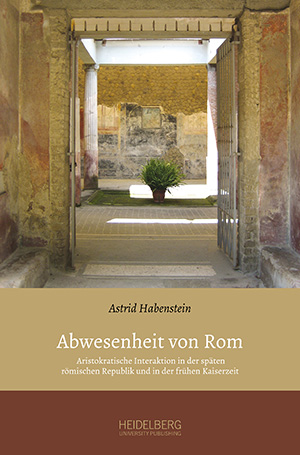
How to Cite
License

This work is licensed under a Creative Commons Attribution-ShareAlike 4.0 International License.
Identifiers
Published
Abwesenheit von Rom
Aristokratische Interaktion in der späten römischen Republik und in der frühen Kaiserzeit
The immense ideological significance that the city of Rome held since the times of the late republic corresponded until the 2nd century AD with the actual supremacy of the urbs within the Imperium Romanum: Rome was the place where socially and politically influential players and groups met; it was where they tried to create an atmosphere of mutual understanding and agreement through complex ways of interaction. Until well into the imperial era the senatorial aristocracy considered the interacting presence of Rome as a major constant of their lifestyle. At least until the 1st century AD the emperors could not disengage themselves from the reference framework that the city was. Therefore, the forms and the reasons for aristocratic and imperial absence are of particular interest. Which role the absence of Rome played in the system of aristocratic interaction and which implications it had for politics and the society of the late republic and the early imperial era is the subject of the present study.
Astrid Habenstein's work was awarded by the Historical Institute at the University of Bern with the prize for the best PhD-thesis in 2012.
Media coverage
"Habenstein hat eine innovative, sprachlich hochwertige und gut lesbare Arbeit zur Abwesenheit aus dem politischen Raum Roms vorgelegt. Sie analysiert detailliert die vielfältigen Formen und Funktionen von Absenz, zeigt maßgebliche Kontinuitätslinien innerhalb ihres Untersuchungszeitraumes auf und vermag die komplexe Symbolsprache des soziopolitischen Phänomens quellennah zu entschlüsseln. Ihre Studie leistet einen wichtigen Beitrag zur Erforschung der aristokratisch-monarchischen Kommunikation und Interaktion in der späten Republik und frühen Kaiserzeit."
Sven Page, in: H-Soz-Kult, 05.12.2016
"Überzeugend behandelt Habenstein die vielfältige politische Symbolsprache, die mit aristokratischer Abwesenheit aus Rom verbunden war. Dabei versteht sie es, immer wieder Vergleiche zwischen republikanischen und kaiserzeitlichen Praktiken an- und Entwicklungen herauszustellen, überdies aber potentiellen Widersprüchen zwischen Kontinuitäten und Diskontinuitäten im Sinne einer stringenten Argumentation dialektisch zu begegnen. Auf diese Weise liefert Habensteins gut lesbare Untersuchung wichtige Einsichten in die Institutionalisierungsprozesse des Prinzipats insgesamt."
Isabelle Künzer, in: sehepunkte 16 (2016), Nr. 2 [15.02.2016]





